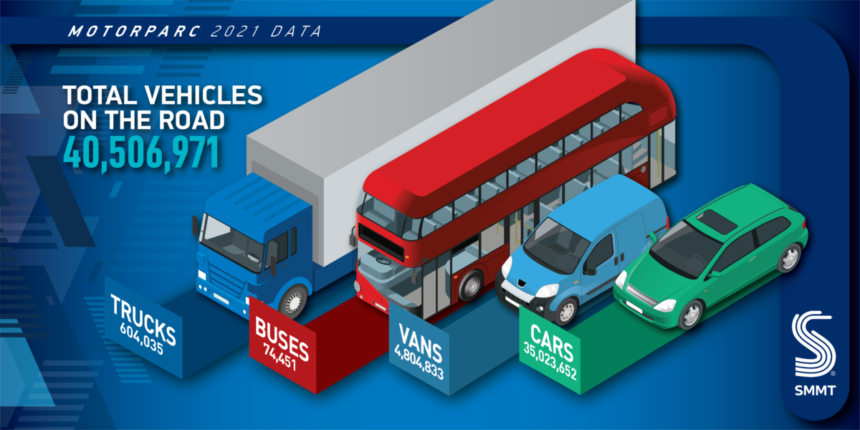UK car parc tops 40 million

- 31/05/2022
- Posted by: Alan Feldberg
- Category: News
The number of vehicles in the UK grew 0.4% to 40,506,971 in 2021, according to new data released by the Society of Motor Manufacturers and Traders (SMMT).
However, despite the increase in the parc, major shortages of key components and supply chain disruptions across the globe caused new car registrations to remain broadly static at 1.65 million, with car ownership falling 0.2% to 35,023,652 vehicles – the second year in a row the car parc has fallen and the first time the UK has experienced consecutive falls in more than a century.
The main driver has been pandemic-related market issues. Global shortages of key components – most notably semiconductors – have constrained the new car market and the lockdowns of the past two years closed dealerships meaning consumers were less able to buy new cars, instead holding on to their vehicles. This contributed to the average car age reaching a record high of 8.7 years, more than a year older than that a decade ago. This means around 8.4 million cars – just under a quarter of those on the road – are more than 13 years old, having been in service since 2008.
However, a bumper year for light commercial vehicles, which saw the number on the road rise by 4.3% to 4,804,833, contributed to an overall increase in the parc. The heavy goods vehicle sector, meanwhile, saw a 2.5% uplift, with 604,035 trucks in Britain making local, national and international deliveries amid increased demand from key sectors.
Electric vehicle ownership continues to grow rapidly; nearly three quarters of a million vehicles on the road today can be plugged in, including 720,053 cars, 26,990 vans, 993 buses and 313 trucks.
Mike Hawes, SMMT chief executive, said: “Britain’s switch to electric vehicles continues to gather pace, with a record one in five new car registrations now plug-ins. However, they still represent around one in 50 cars on the road, so there is significant ground to cover if we are to fully decarbonise road transport at pace.
“The first consecutive annual fall in vehicle numbers in more than a century shows how significantly the pandemic has impacted the industry, leading Britons to hold onto their cars for longer. With fleet renewal essential to net zero, we must build consumer confidence in the economy and, for drivers, confidence in the charging infrastructure to get the transition into top gear.”



